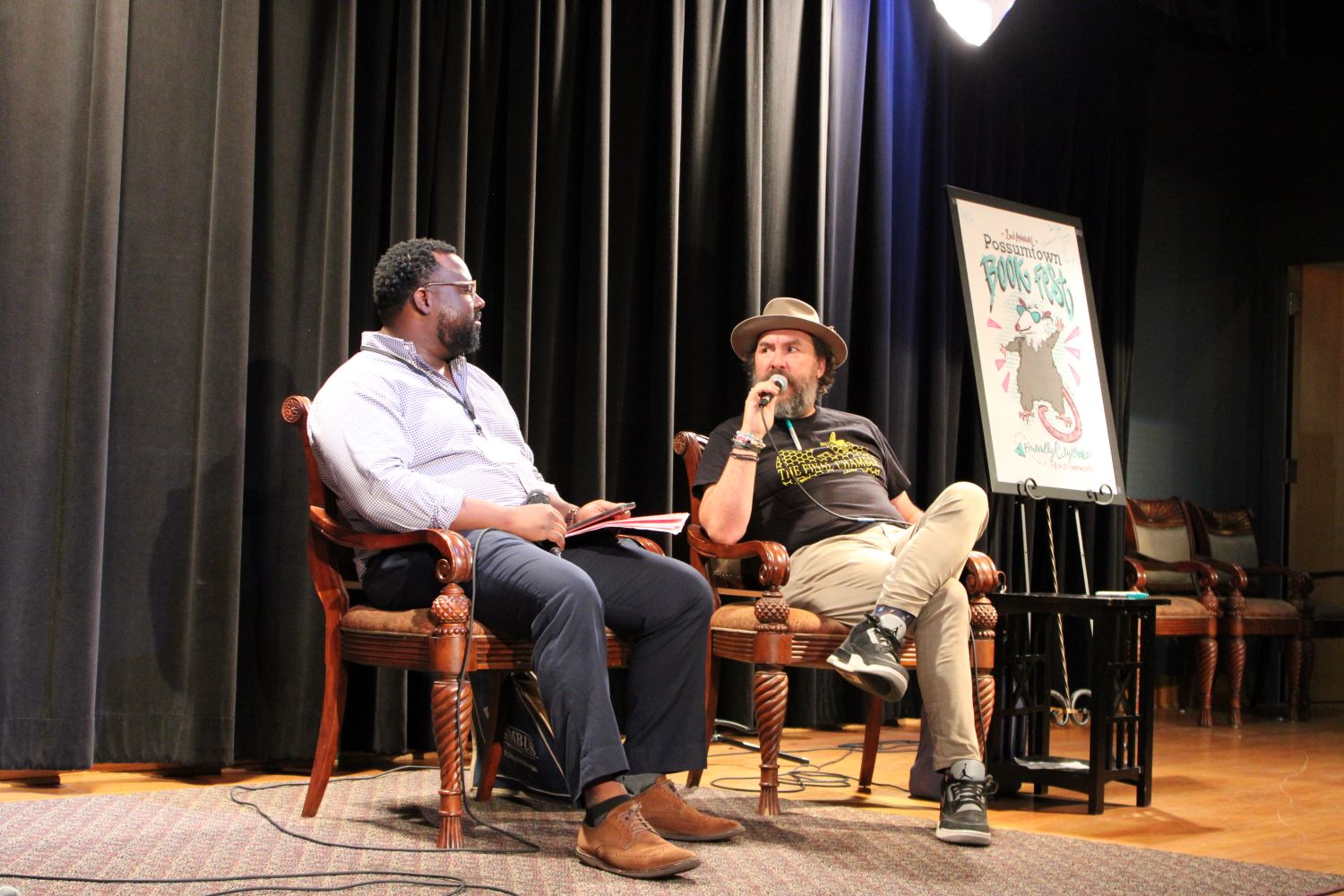COLUMBUS – When Wright Thompson set out to research the murder of Emmett Till, he thought he already knew most of the story. What he uncovered showed just how much he didn’t.
Thompson’s book, “The Barn: The Secret History of a Murder in Mississippi,” explores not only the 1955 killing of 14-year-old Emmett Till, but the layered history of the land and the people tied to it, many of whom, Thompson said, were written out of the record.
“I thought I knew, and it turns out I didn’t, which was a little terrifying,” Thompson said. “When you don’t know something this fundamental about the place you claim to know best, then that’s a real problem.”
Thompson discussed his book in an Omnova Theatre packed with attendees Saturday at Possumtown Book Fest, hosted at the Columbus Arts Council’s Rosenzweig Arts Center. The festival featured Thompson as the keynote speaker, alongside eight author panels discussing Choctaw Culture, nonfiction, horror, global stories, mystery and romance.
Emily Liner, owner of Friendly City Books downtown, organized the event.
Upstairs, panels ran throughout the day from 9:15 a.m. to 4:45 p.m. Downstairs, visitors filtered in and out, browsing stacks of books, chatting with authors, collecting possum-themed gifts and lining up for book signings after each session.
Thompson discussed both the contents of “The Barn,” and the depth of research required to tell it.
“This book is centered on one 36 square-mile block,” Thompson said. “Most books either go deep or wide, and the thing I wanted to do was both. So, I picked one square of land and then literally tracked every dollar in and every dollar out, every person in and every person out.”
The book is structured in four acts: the first examines the 1955 murder; the second traces 1,300 years of history on that same patch of land; the third returns to the events around Till’s killing, and the fourth centers on his living family members who are still “trying to fight with memory the forces of erasure.”
Thompson began research in April 2020 and released the book in September 2024, spending four years combing through land records, court files, knocking on doors and developing relationships with members and friends of the Till family.
“It’s really footnoted and endnoted,” Thompson said. “If you’re going to be writing about this, you have to show your work in this day and age. I think people don’t trust people, and understandably so. … But I think if you’re from here, you know it’s true. You might pretend in some rooms that it isn’t. But when you’re home alone in the mirror, this is gospel.”
Ezra Baker said he attended Thompson’s panel because his work exposed suppressed history.
“It’s exposure of what happened back in the 50s and how things was covered up,” Baker said. “Being in the position to really learn and reach out to people, I think it’s good for the community, for the state of Mississippi and the United States of America. We just need to expose all these hidden truths. It’s a part of our culture.”
Other panelists
Other panels throughout the day focused on Mississippi storytelling in different forms.
At the Rooted Magazine panel, Julie Whitehead spoke about “Hurricane Baby,” her collection of fictional short stories exploring how Hurricane Katrina impacted Mississippians.
Whitehead said part of her inspiration for writing the book was seeing how under-reported the hurricane’s effects were in Mississippi.
“I was watching the news and … everybody was so positive,” Whitehead said. “‘We lost everything but me, Mama and the dog, but we’re going to make it,’ That kind of talk. And I thought, what about the people that aren’t so sure about their chances after the storm?
“That’s one reason I wrote the book, to show what did happen in Mississippi and how it did affect Mississippi and how deeply it continues to affect us, even now.”
Fellow panelist Benjamin Morris, of Hattiesburg, discussed his 16-year effort to travel all of Mississippi’s numbered highways, mapping them in sonnet form. Since 2009, he’s written about 20 of the state’s roughly 60 highways.
“I really believe the roads of Mississippi have stories to tell,” Morris said. “We all know they do. … We all know what happens when stories get silenced and buried and have to be dug back up in order to come to light.”
Attendee Debbie Fancher said she connected with the panelists’ Mississippi ties.
“I connect with feelings, I think,” Fancher said. “… It’s just interesting to see how people think. I’m a math teacher, not language, so this is very new to me. It’s a different world for me. I came last year at 9 a.m. to stay an hour and then stayed all day. And you know what? It looks like that’s happening this year as well.”
Katie Bouchillon drove about an hour from Ackerman to attend the festival and said she’ll be returning again next year.
“We came last year too,” Bouchillon said. “We went to the Choctaw panel this morning and it was fantastic. I’ve learned things I never knew before. … So far, I love (Book Fest). I’m so glad it’s had such a good turnout.”
Posted in Columbus & Lowndes County
Quality, in-depth journalism is essential to a healthy community. The Dispatch brings you the most complete reporting and insightful commentary in the Golden Triangle, but we need your help to continue our efforts. In the past week, our reporters have posted 45 articles to cdispatch.com. Please consider subscribing to our website for only $2.30 per week to help support local journalism and our community.

